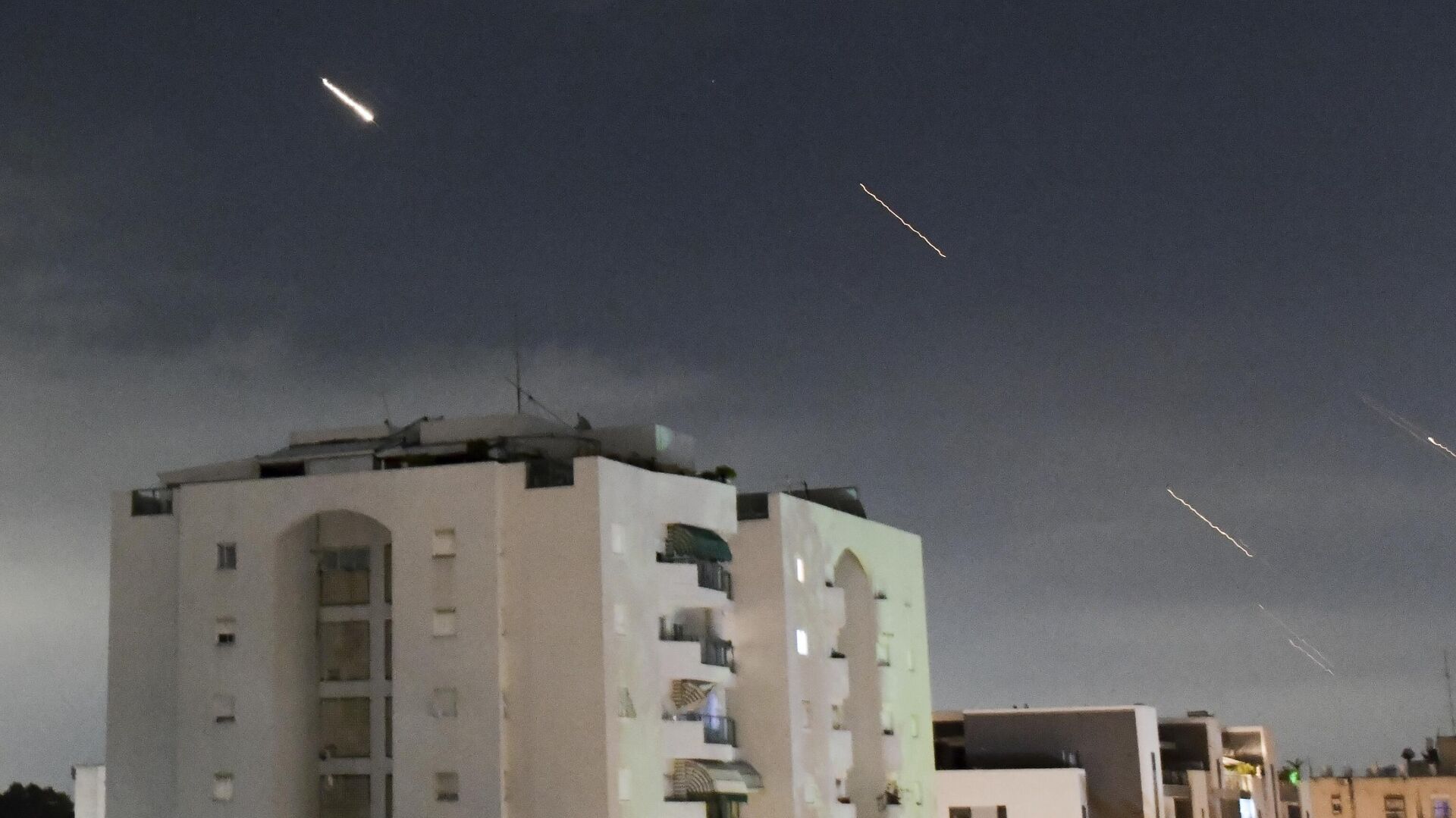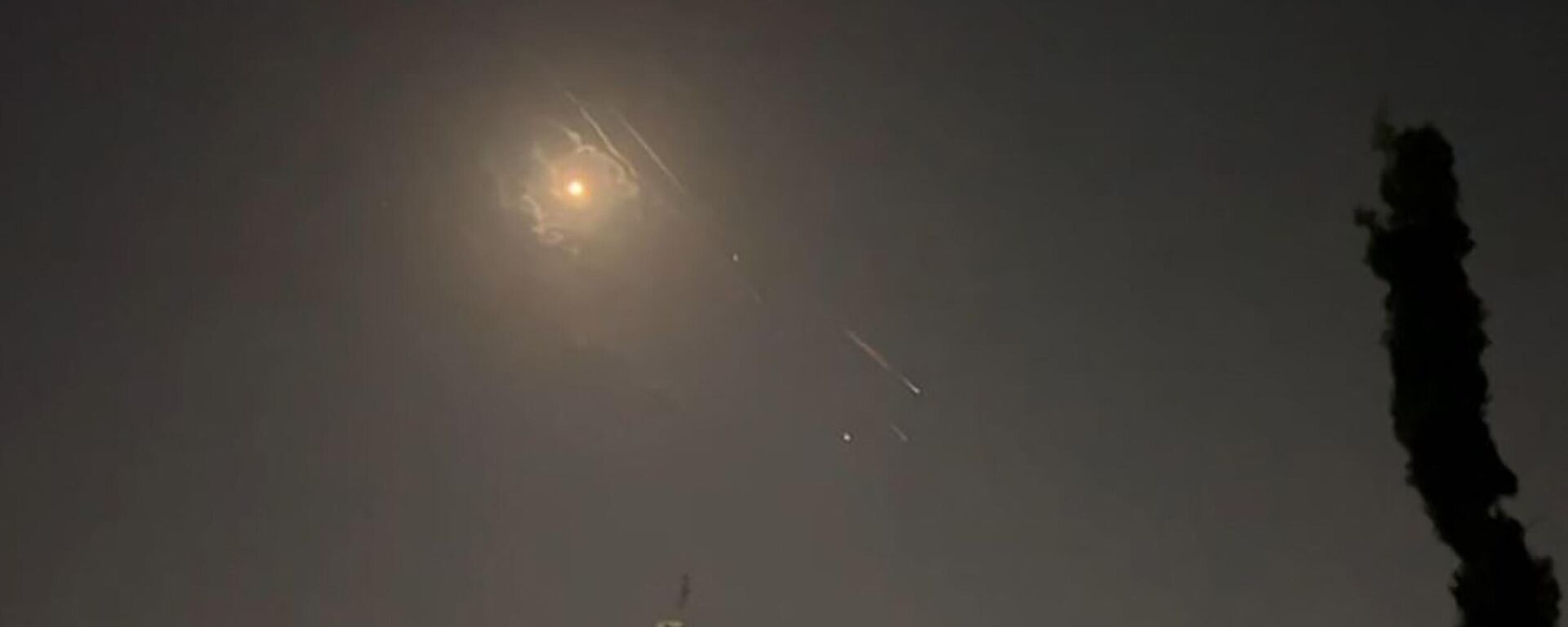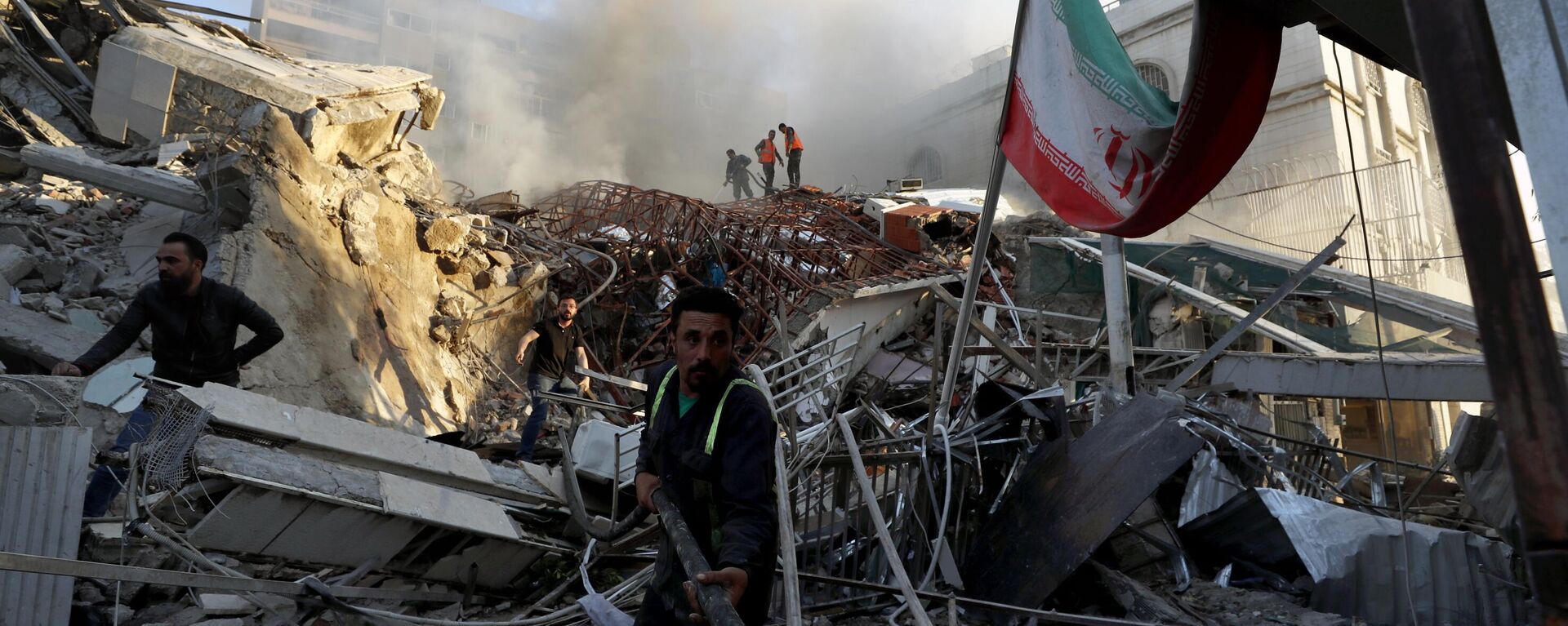https://sputnikglobe.com/20240414/strike-on-israel-shows-us-bases-near-iran-are-achilles-heel---analyst-1117924035.html
Strike on Israel Shows US Bases Near Iran Are 'Achilles Heel’ - Analyst
Strike on Israel Shows US Bases Near Iran Are 'Achilles Heel’ - Analyst
Sputnik International
Iran’s retaliatory attack on Israel from its own territory is a sign that it could all “escalate out of control,” Michael Maloof, a former senior security analyst in the office of the US secretary of defense, told Sputnik.
2024-04-14T11:42+0000
2024-04-14T11:42+0000
2024-04-14T11:42+0000
analysis
iran
israel
palestine-israel conflict
israel defense forces (idf)
iran-israel row
https://cdn1.img.sputnikglobe.com/img/07e8/04/0e/1117922810_0:161:3071:1888_1920x0_80_0_0_d9a9266cec90a2d0ea96792030a8e6f9.jpg
Iran’s massive retaliatory attack on Israel from its own territory is a sign that the conflict could “escalate out of control.” Michael Maloof, a former senior security analyst in the office of the US secretary of defense, told Sputnik that the first ever direct Iranian attack on Israel set a dangerous precedent.Iran’s assault, which it stated was an act of “self-defense” after the Israeli strike on its consulate in Damascus, was originally intended to be a “limited” one, said Maloof.Iran first sent in “swarms of drones with lights on as a sign of psychological warfare,” but sending in cruise and ballistic missiles by Tehran was a “distinct escalation,” said Maloof.The scale of Iran’s attack on Israel suggests that Tehran was sending a message, demonstrating that it possesses “extraordinary capabilities,” said Maloof."They have built up their missile capabilities extraordinarily, they have drones, cruise missiles, and some of the most accurate ballistic missiles in the region right now," he added."I think that if Israel were to retaliate, then I think they would engage the more sophisticated missiles and hypersonics, potentially, if they have them," He added. "Then you're talking some very serious escalation in the entire region. It's already unprecedented, but this escalation could be even ratcheted up that could conceivably bring in other and extend beyond just this region."All signs point to the potential of a larger regional war erupting, Maloof warned, adding that everything now depends on Israel's reaction. "Is this a tit-for-tat, a one-on-one, or a further escalation?" he asked. Israeli Prime Minister Benjamin Netanyahu is prepared to “continue an endless war in the region,” suggested Maloof, adding that he “knows he had the US backing,” and could opt to strike now, taking advantage of this "window of opportunity."“He may not get such an opportunity under a potential Trump administration coming in [after the US elections in November]," said the expert.Looking at possible scenarios for Israel’s response, he noted that Tel Aviv had already stated publicly an intention to "go after the nuclear sites in Iran."“That is going to be exceedingly difficult, plus I don’t know that they have the power projection to do that on any consistent basis, and secondly, I don’t believe they have the so-called ‘bunker busters’ that would be needed to be able to drill down through the mountains to reach those facilities. The US has been reluctant to give Israel these bunker buster [munitions]," said Maloof.As for the US, it has already “gotten sucked into this,” Maloof noted.“There is already a call in Congress to put on fast-track the legislation to approve new ordinance, and the $14 billion for Israel,” said the pundit. He remarked that the Pentagon might “empty its stockpiles to provide support to Israel,” and recalled that besides giving Israel bombs and artillery, the US supports its Iron Dome air defense system, whose missiles will need to be replenished.According to the ex-Pentagon analyst, much now also depends upon what stockpiles Iran has and "with what consistency they can keep sending these wave after wave of drones and ballistic missiles... Ultimately, if they have them, the hypersonics... and there's no defense against hypersonics. Not even Israel's ‘Arrow’ system, which is designed to deal with ballistic missiles... And apparently, that's been engaged tonight, as well as the Iron Dome."The United Nations (UN) Security Council is to meet on Sunday in response to a request from Gilad Erdan, Israel's permanent representative to the United Nations. The meeting is scheduled for 4 pm New York time (2000 GMT), as announced by the UN Department of Global Communications.“I'm hoping that the UN Security Council can take this up and maybe some adult supervision could begin to intervene in this and maybe try to bring it to a halt for now," Maloof said. "But right now, this minute, it doesn't look like it. And again, it's going to depend upon the response from the Israelis if they go directly into Iran in response."The current media frenzy surrounding the Iran strike is “disproportionately amplified compared to the actual events transpiring on the ground,” Dr Ahmed Al Ibrahim, a Riyadh-based political analyst, told Sputnik.He added that any true aftermath of Iran's strike will be discernible after a “thorough assessment.” He expressed skepticism that any Middle Eastern countries would “willingly entangle themselves in the unfolding chaos.” Arguing that “Iran's capacity to directly threaten Israel is limited by geographical constraints,” Ibrahim agreed that there is “potential for escalation.”
https://sputnikglobe.com/20240413/khamenei-aide-iran-wearing-israel-down-in-psychological-war-as-panicky-tel-aviv-awaits-strikes-1117916795.html
https://sputnikglobe.com/20240414/iran-says-retaliation-strike-on-israel-concluded-attack-hit-designated-targets-1117921963.html
https://sputnikglobe.com/20240414/escalation-in-middle-east-to-expedite-joint-assistance-package-for-ukraine-israel---expert-1117923641.html
iran
israel
Sputnik International
feedback@sputniknews.com
+74956456601
MIA „Rosiya Segodnya“
2024
News
en_EN
Sputnik International
feedback@sputniknews.com
+74956456601
MIA „Rosiya Segodnya“
Sputnik International
feedback@sputniknews.com
+74956456601
MIA „Rosiya Segodnya“
iran israel relations, iran strikes israel, iran carries out retaliatory attack on israel, iran's airborne strike on israel, iran attacked israel with drones and missiles, iran attack hit designated targets in israel, what targets did iran's attack on israel hit, did iran's attack on israel cause damages, middle east tensions, iran islamic revolutionary guard corps, iran israel war, israeli airstrike
iran israel relations, iran strikes israel, iran carries out retaliatory attack on israel, iran's airborne strike on israel, iran attacked israel with drones and missiles, iran attack hit designated targets in israel, what targets did iran's attack on israel hit, did iran's attack on israel cause damages, middle east tensions, iran islamic revolutionary guard corps, iran israel war, israeli airstrike
Strike on Israel Shows US Bases Near Iran Are 'Achilles Heel’ - Analyst
Fears of a greater Middle East escalation were triggered after Iran launched a massive drone and missile attack against Israel, aided by Hezbollah and the Yemeni Houthis. Iran said the attack was in response to Israel's bombing of the Iranian consulate in Damascus, Syria, which killed seven members of the elite Revolutionary Guard Corps.
Iran’s
massive retaliatory attack on Israel from its own territory is a sign that the conflict could “
escalate out of control.”
Michael Maloof, a former senior security analyst in the office of the US secretary of defense, told Sputnik that the first ever direct Iranian attack on Israel set a dangerous precedent.
“My concern is that this could easily escalate into something not only between Iran and Israel, but beyond the Middle East region,” he said.
Iran’s assault, which it stated was an act of “
self-defense” after the Israeli
strike on its consulate in Damascus, was originally intended to be a “
limited” one, said Maloof.
Iran first sent in “swarms of drones with lights on as a sign of psychological warfare,” but sending in cruise and ballistic missiles by Tehran was a “distinct escalation,” said Maloof.
The scale of Iran’s attack on Israel suggests that Tehran was sending a message, demonstrating that it possesses “extraordinary capabilities,” said Maloof.
"They have built up their missile capabilities extraordinarily, they have drones, cruise missiles, and some of the most accurate ballistic missiles in the region right now," he added.
“I think that this clearly showed that Iran has a capability. I think it's limited. They cannot do this on a sustained basis. And they did send their slower ordinance, such as drones, UAVs. But they also claim to have hypersonics," Maloof noted.
"I think that if Israel were to retaliate, then I think they would engage the more sophisticated missiles and hypersonics, potentially, if they have them," He added. "Then you're talking some very serious escalation in the entire region. It's already unprecedented, but this escalation could be even ratcheted up that could conceivably bring in other and extend beyond just this region."
Iran carried out a massive drone and missile attack against Israel along with Lebanon's Hezbollah and Yemen's Ansar Allah-led government. Over 300 projectiles were fired at Israeli territory from Iran. The Islamic Revolutionary Guard Corps (IRGC) said the assault was an act of self-defence in retaliation for “the strike on the consulate section of the Iranian embassy in Damascus." Israel claimed that 99 percent of the projectiles were intercepted, but added that a “small number of hits were identified”, including at a base in southern Israel, “where minor damage was caused to infrastructure”.
All signs point to the potential of a larger regional war erupting, Maloof warned, adding that everything now depends on Israel's reaction. "Is this a tit-for-tat, a one-on-one, or a further escalation?" he asked.
"I think we are already getting that message from Netanyahu, his ministers, that they are going to respond... How they respond is going to determine the extent of that escalation through the [Middle East] region," stressed Maloof. "I am quite concerned that neither side is going to stand down at this point.”
Israeli Prime Minister Benjamin Netanyahu is prepared to “continue an endless war in the region,” suggested Maloof, adding that he “knows he had the US backing,” and could opt to strike now, taking advantage of this "window of opportunity."
“He may not get such an opportunity under a potential Trump administration coming in [after the US elections in November]," said the expert.
Looking at possible scenarios for Israel’s response, he noted that Tel Aviv had already stated publicly an intention to "go after the nuclear sites in Iran."
“That is going to be exceedingly difficult, plus I don’t know that they have the power projection to do that on any consistent basis, and secondly, I don’t believe they have the so-called ‘bunker busters’ that would be needed to be able to drill down through the mountains to reach those facilities. The US has been reluctant to give Israel these bunker buster [munitions]," said Maloof.
As for the US, it has already “gotten sucked into this,” Maloof noted.
US President Joe Biden issued a statement on Iran’s attack against Israel after speaking with Netanyahu by phone. Biden condemned the attack “in the strongest possible terms”. He reaffirmed Washington’s “ironclad commitment” to help support Israel’s security. Secretary of State Antony Blinken said the US does “not seek escalation” but will “continue to support” Israel’s defense. “I will be consulting with allies and partners in the region and around the world in the hours and days ahead,” he added.
“There is already a call in Congress to put on fast-track the legislation to approve new ordinance, and the $14 billion for Israel,” said the pundit. He remarked that the Pentagon might “empty its stockpiles to provide support to Israel,” and recalled that besides giving Israel bombs and artillery, the US supports its Iron Dome air defense system, whose missiles will need to be replenished.
“If you have a swarm, wave after wave of swarms, Israel is going to be very hard pressed to be able to defend against that. And that's why the US now is coming in, and that gets the US directly involved," Maloof pointed out. "And that could then open up US assets in the region." We have got some 35 bases that surround Iran, and they thereby become vulnerable. They were meant to be a deterrence. Clearly, deterrence is no longer on the table here. Now they become the American Achilles heel because of their vulnerabilities to attack. They've got air defense systems, but they've got to be replenished. And given that you got active war going on right now in the region, it's going to be difficult to replenish those supplies."
According to the ex-Pentagon analyst, much now also depends upon what stockpiles Iran has and "with what consistency they can keep sending these wave after wave of drones and ballistic missiles... Ultimately, if they have them, the hypersonics... and there's no defense against hypersonics. Not even Israel's ‘Arrow’ system, which is designed to deal with ballistic missiles... And apparently, that's been engaged tonight, as well as the Iron Dome."
The United Nations (UN) Security Council is to meet on Sunday in response to a request from Gilad Erdan, Israel's permanent representative to the United Nations. The meeting is scheduled for 4 pm New York time (2000 GMT), as announced by the UN Department of Global Communications.
“I'm hoping that the UN Security Council can take this up and maybe some adult supervision could begin to intervene in this and maybe try to bring it to a halt for now," Maloof said. "But right now, this minute, it doesn't look like it. And again, it's going to depend upon the response from the Israelis if they go directly into Iran in response."
The current media frenzy surrounding the Iran strike is “disproportionately amplified compared to the actual events transpiring on the ground,” Dr Ahmed Al Ibrahim, a Riyadh-based political analyst, told Sputnik.
He added that any true aftermath of Iran's strike will be discernible after a “thorough assessment.”
“Indeed, I dismiss the current situation as largely sensationalized, a "bubble" inflated by media coverage and public attention,” the political analyst said.
He expressed skepticism that any Middle Eastern countries would “willingly entangle themselves in the unfolding chaos.” Arguing that “Iran's capacity to directly threaten Israel is limited by geographical constraints,” Ibrahim agreed that there is “potential for escalation.”







